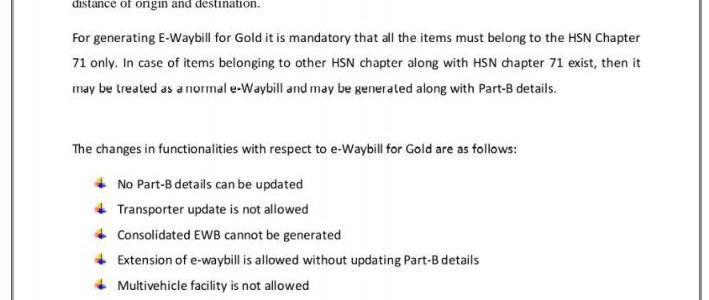Penalty cannot be imposed for incorrect address mentioned in the e-way bill, unless an inquiry is made to ascertain whether there was any intent to evade tax in mentioning the wrong address: Madras High Court
Petitioner’s transporter, on being intercepted, was found to carry GST paid goods to the petitioner’s office at Jabalpur whereas e-way bill generated showed destination as Indore. The State Tax Officer invoking its power under sec. 68 r/w sec. 129 of CGST Act, levied tax as well as penalty. Petitioner challenged the order by way of appeal but the same was rejected. Being aggrieved, petitioner moved the High Court by way of Writ Petition.
Petitioner argued that due to inadvertence during generation of the e-way bill, a clerical error took place due to which the registered address of the petitioner at Indore was mentioned in the e-way bill instead of the address at Jabalpur.
Revenue argued that exemption from the rigour of sec. 129 can only be availed on arising of contingencies as enumerated in Clause 5 of Circular No. 64/38/2018-GST, dated 14-09-2018. One of the contingencies which may extend immunity from sec. 129 relates to error in address of the consignee to the extent of locality, provided that the other details of consignee are mentioned correctly. As such, the benefit of clause 5 of the said Circular is not available to the petitioner.
The HC observed that strictly going by the terminology used in the immunity provision under Clause 5 of the circular, the benefit flowing therefrom may not be available to the petitioner, but in penal provision such as sec. 129, the element of intention to evade tax must be present to sustain an order of penalty. To gather the intention of the petitioner an inquiry must be undertaken to ascertain whether the mistake was inadvertent with no element of malice or intention to evade tax. It does not appear that either the Taxing Authority or the appellate authority has undertaken the said exercise of to ascertain the real intent behind the act of petitioner to mention wrong address.
The HC, therefore, quashed the appellate order and directed the appellate authority to reconsider the appeal solely on the question of presence or absence of any malafide intention to evade tax on the part of the petitioner and pass appropriate orders within three months.
𝗜𝗺𝗽𝗼𝗿𝘁𝗮𝗻𝘁 𝘁𝗮𝗸𝗲𝗮𝘄𝗮𝘆𝘀:
1. Element of intention to evade tax must be present in order to sustain order of penalty.
2. An inquiry must be undertaken to ascertain intention of the taxpayer as to whether the mistake was inadvertent or with intent to evade tax.
3. Penalty is not automatic and should not ordinarily be imposed unless the party obligated either acted deliberately in defiance of law or is found to be guilty of conduct contumacious or dishonest, or acted in conscious disregard of its obligation. Penalty will not be imposed merely because it is lawful to do so as held by the Hon’ble Supreme Court in Hindustan Steel Ltd. 25 STC 211.
